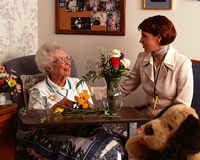End of Life Care

End of life care can help during the last part of your loved one's life. End of life care includes physical, emotional and spiritual comfort. It focuses on quality of life and dignity for your loved one. It also helps caregivers and family members.
Why Is It Important?

After stroke, your loved one’s quality of life may be poor. Facing a loved one’s death is difficult. You both may feel confused about what to do next. End of life care gives support at this difficult time. It helps you enjoy your time together as long as possible.
What Do You Need to Know?
Talk with your healthcare team. Ask about your loved one’s condition. Ask about available supports, treatments and resources. Your goal is to keep your loved one safe and comfortable.
What Kinds of Services Are Available?
Most end of life is provided through hospice. Generally, hospice is for patients who have 6 months or less to live.
Hospice care focuses on quality rather than length of life. Hospice gives care which relieves symptoms, but does not cure. Hospice services include:
- Pain and symptom control to help your loved one be comfortable.
- Spiritual care for your loved one and family. It helps everyone look at what death means. It may help the family say goodbye.
- Respite care to give the family a break from caregiving. Volunteers can run errands for you. They can sit with your loved one. Learn more about respite care.
- Family conferences to help everyone stay informed about your loved one's condition. Feelings can be shared about what to expect.
- Bereavement care to help families through the grieving process before and after death.
Who Makes Up a Hospice Team?
Usually a trained team manages hospice care. Hospice teams may include doctors, nurses, social workers and counselors. They also often include:
- Speech, physical and occupational therapists
- Home health aides
- Trained volunteers
Hospice teams are available 24 hours a day, 7 days a week. An on-call nurse answers phone calls day and night. The nurse makes home visits or sends a team member when needed.
How Can You Find Hospice Care?
Most hospice care takes place in the loved one’s home. Hospice care may be given in a facility like a nursing home. Some hospices provide care in their own facilities. Some home health agencies provide hospice care.
To find hospice care in your community, ask your healthcare team. You can also contact the National Hospice and Palliative Care Organization (NHPCO). The Resources section has their contact information.
Many VA hospitals have end of life care programs. The Home Based Primary Care Program gives services to Veterans in their homes. Ask your social worker about end of life care services at your local VA.
How Do You Pay for End of Life Care?
Veterans are eligible for hospice services through their VA or a community hospice program.
Medicare pays for most hospice care. Medicaid pays for hospice services in most states. Many HMOs and other insurance companies offer hospice coverage. Check into your loved one’s benefits plan. Patients usually can get hospice services even if they cannot pay.
What Can You Do for Your Loved One?
The best gift you can give your loved one is your attention. Be supportive and be yourself. A gentle touch or massage may help. Hold your loved one's hand. Provide a calm and peaceful environment.
Helpful Tips
- Talk to other caregivers who have been through the death of a loved one.
- Discuss health care choices while your loved one still can. Set up an advance directive. Examples are a living will or a health care power of attorney. These legal documents state your loved one's wishes for medical care. Learn more about getting help with legal matters.
- Take care of yourself. Arrange for time off for yourself. Ask friends, family, neighbors and others for help. Learn more about getting help from family, friends and community.
Remember
- Discuss health care choices while your loved one still can.
- Talk with your healthcare provider about treatments. Discuss end of life care for your loved one.
- End of life care helps your loved one and family enjoy your time together as long as possible.
More Resources 
Additional credible resources on this topic can be found here. Website pages may change or update, therefore if a link does not work, you may also try to type the information into your internet search bar. This Resource List will be updated frequently.
|
*Link Disclaimer: Links to information and Web sites outside of the Department of Veterans Affairs do not indicate an endorsement of products or services offered by the sites. In addition, these sites may have privacy and security policies that are inconsistent with those of VA. |
References: Hospice Foundation. (2008). Hospice Info – Informative Review on Hospice. Retrieved December 12, 2008, from: http://www.hospicefoundation.org/hospiceInfo/; Caregivers Library. (2008). End of Life Issues. Retrieved December 4, 2008, from: http://caregiverslibrary.org*; Caring Connections. (n.d.) End of Life Caregiving. Retrieved December 8, 2008, from: http://www.caringinfo.org/CaringForSomeone.htm*; Houts, P.S. (Ed.), ElderCare at Home – Dying at Home, Advance Directives, 2nd ed., New York, NY: The AGS Foundation for Health in Aging; American Cancer Society. (2009). What Is Hospice Care?, Retrieved January 20, 2009, from: https://www.cancer.org/cancer/end-of-life-care/hospice-care/what-is-hospice-care.html*
These materials were created for the project:
Web-Based Informational Materials for Caregivers of Veterans Post-Stroke
Project Number SDP 06-327 funded by VA HSR&D Quality Enhancement Research Initiative (QUERI)



















